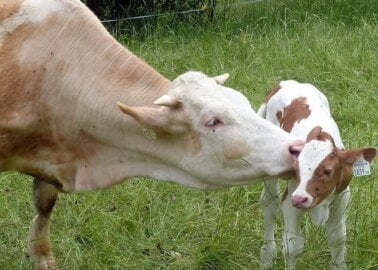‘Crappy’ Eggs Not ‘Happy’ Eggs: Don’t Trust Advertising Standards Authority’s Ruling
Earlier this year, PETA exposed suffering and death on farms supplying the Happy Egg Co. We reported the brand to the Advertising Standards Authority (ASA) for duping caring consumers with misleading marketing that depicts hens in lush green fields, looking happy and healthy. The brand uses taglines like, “Free range and happy, natural goodness starts with our hens,” and on its website boasts that the hens have “room to roam” and “special activity kits” and that “when you put happy in, you get happy out”.
The Happy Egg Co, owned by Noble Foods, is one of the largest “free-range” egg producers in the UK. It states that all of the farms supplying it exceed RSPCA Assured’s free-range standards. After PETA visited farms in Cumbria, Gloucestershire, and Herefordshire that supply eggs to the brand, it became clear that the marketing materials used are designed to deceive.
Now, after months of deliberation, the ASA has made its ruling.
So, What Did the ASA Say?
After hearing from PETA that investigative footage revealed the majority – if not all – of the birds seen on farms supplying the Happy Egg Co were found with portions of their beaks cut off, the ASA presented PETA’s images to Noble, and all images of hens with intact beaks were subsequently removed from the brands marketing materials.
The tip of the beak is a highly sensitive organ, and beak trimming can cause acute and chronic pain. If severe, trimming can also cause painful neuromas – masses of nerves that lead to persistent pain for the rest of the birds’ lives. Using imagery of hens with intact beaks is completely misleading for caring consumers.
We’re disappointed, however, that the ASA chose not to uphold valid complaints made by PETA and members of the public – such as presenting hens in green fields, when in reality, thousands of them are crammed into filthy, dark sheds with one piece of enrichment for every 1,000 birds.
The ASA justified its ruling by claiming that the company had various protocols in place to exceed the RSPCA Assured’s standards. All this does is reveal how low these standards are and that they fail to protect chickens from suffering in environments that are so poor, consumers would be appalled. The ASA has failed to acknowledge that the way the birds are forced to live is entirely different from the imagery presented by the company. The stark contrast between the expectations set by the Happy Egg Co and the reality of life for chickens on farms that supply the brand is as clear as day:
Shockingly, the suffering we uncovered was mostly legal, and only one of the farms was temporarily suspended from the RSPCA Assured scheme. This highlights how low the bar is and that these assurance schemes can’t be trusted to ensure that animals live happy lives.
Why the Outcome Is Disappointing
The company’s marketing materials present idyllic scenes – in which chickens are given acres of green fields to explore and foliage and trees to play in – to lead consumers to believe that its products come from happy hens.
In reality, we filmed disingenuously named “free-range” hens in filthy, severely crowded sheds. The hens had been subjected to routine mutilation, and birds with open wounds had been left without veterinary treatment, while others who had died in the hellish environment were left to rot amongst the living. Many were practically featherless because other hens – driven by the stress and frustration of being kept in such unnatural conditions – had pecked out their feathers, leaving their skin raw and bleeding. This is a common sight on egg farms, and it’s associated with a lack of time spent outdoors. Although farms may have an outdoor area, many hens are too afraid to venture out. The bare, barren space is entirely inadequate and anxiety-provoking for nervous prey animals, and all but the most dominant hens are too scared to push through thousands of other birds to reach the opening.
The day-to-day lives of these birds don’t match the company’s marketing materials – and the Happy Egg Co knows it. The company’s bright, cheery branding aims to convince consumers that its products come from happy hens. A whole section of its website is dedicated to the unsubstantiated and misleading claim that the hens are happy. After viewing the footage, University of Winchester Veterinary Professor of Animal Welfare and Ethics Andrew Knight commented, “Despite evidence that the chickens’ beaks have been trimmed, it appears that feather pecking – suggestive of stress and frustration – is still going on. It’s hard to imagine that these chickens are happy.”
The hens on farms supplying the Happy Egg Co are certainly not happy. We’re disappointed that the ASA fails to acknowledge this and take further action. If the hens are so happy, why doesn’t the company use PETA’s investigation photos for its marketing instead?
What You Can Do
Don’t be duped. It’s clear from this ruling that we can’t trust marketing materials and that the assurance schemes meant to protect animals aren’t worth the paper they’re printed on. The only label that guarantees an animal-friendly product is “vegan”. The best way to help these sensitive and gentle animals is to stop eating animal-derived foods, including eggs.
Reducing demand for their eggs will help prevent chickens from being forced to live – and die – in these heartbreaking conditions. There are so many great alternatives to eggs that you don’t need to stop eating your favourite meals – just swap a few ingredients.
Please also take a moment to speak out for hens by sending a message to the Happy Egg Co to let it know that you’re unhappy with its misleading marketing materials:




